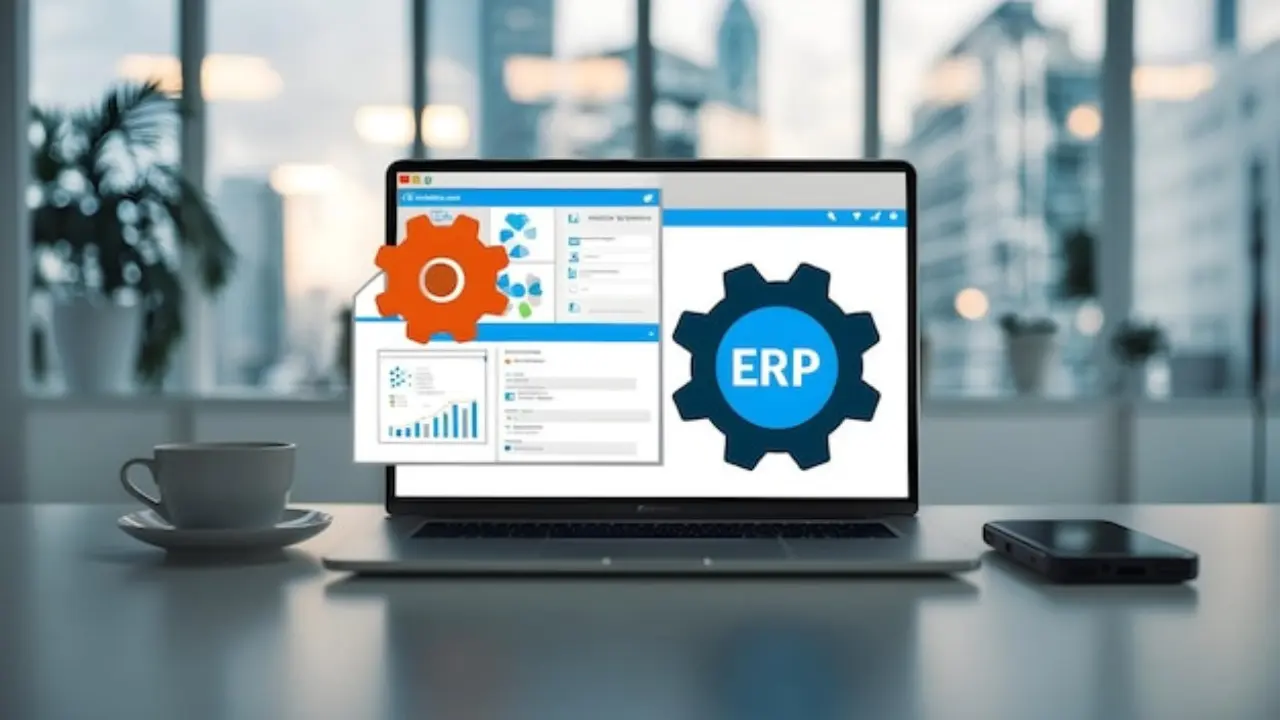

How to Choose the Best ERP Software: Challenges & Solution
ERP (enterprise resource planning) software is a tool that fully optimizes your organization's key operations by digitizing the tasks. ERP consists of various modules that have AI-built functionality, improving business performance efficiency. ERP supporting top modules involve, HRMS, procurement management, inventory, project, production, asset, expense, warehouse monitoring, and so on.
An ERP framework can smooth out various business tasks by automating them and giving a focal center to all divisions. Implementing an ERP can be tricky because it influences different divisions and expects individuals to adjust to the new processes. Each module comes with various features to streamline your brand operations. So, implementing an enterprise resource planning tool in your system is not that easy or complicated, it only requires a basic of technology to fully start with it.
Thus, in this blog, we will explore the common challenges in implementing ERP software, solutions to fix them, tips, and at last the reliable and best ERP software for your dedicated business. First, let us know the basics of ERP and its execution.
What Is an ERP System & ERP Execution?
ERP software supports different business functions like finance, sales, HR, and marketing. An ERP system is precisely given focal data to the whole organization. This allows everyone to access similar data, encouraging better decisions. Furthermore, ERP execution is a multi-step process that includes business process repetition that leverages information configuring, data migration, and client preparation. This interaction requires a couple of months and is typically directed by a group with representatives from various departments.
Why Is ERP Important for Business Success?
The power of ERP systems plays an essential role in speeding up your journey toward achieving your goals. Consider an ERP system that acts as the central sensory software for your business and coordinates with different departments like sales, HR, finances, accounting, procurement, and many more in a single platform. Thus these are the advantages of using ERP software.
- Freeing up your team’s time for essential work means saying hello to a system that automates processes and handles tasks automatically.
- ERP improves data management across various applications as ERP provides a single source of truth, ensuring everybody has access to similar data.
- Improve data visibility and work processes which leads to a boost in efficiency and productivity.
- Make better data-driven decisions for better business results along with real-time data and insights.
After knowing its criticalness, move further towards the challenges brands face while integrating it into their software.
Challenges While Implementing ERP Software
While the advantages are unquestionable, implementing an ERP system requires careful planning and effort. The following are the 7 Key Challenges that can emerge during ERP execution.
Challenge 1 -
ERP execution includes different stages and project management tasks that are essential to be focused on and require support from everyone which can be difficult sometimes as everybody has different needs.
Challenge 2
Organizations frequently misjudge the time and financial plans for successful execution. A few guilty ones for spending plans overwhelming the scope of the project adding highlights that are not there in the original plan and keeping the target needs.
Challenge 3
A Critical step in ERP implementation is data migration which is a core ERP benefit for precisely giving data to the entire organization. This typically involves moving data from multiple older system into ERP Database at a centralized location. The data needs to be located which is more challenging than expected as the information might dispersed across different divisions in Finance or accounts.
Challenge 4
The data stored in various formats at different places can be wrong or have inconsistencies as when all information is identified, organizations focus on data migration to the ERP system. This might include data cleaning because various departments manage the same data for a product, customer, or order and there can be duplicate versions of the same.
Challenge 5
ERP system implementation goes beyond just putting in new software as it generally includes revamping business processes to exploit the system’s efficiency and productivity to upgrades. This requires an outlook shift and adjustments to regular work processes for many employees, presenting ERP implementation challenges.
Challenge 6
ERP projects are for financial plans exceeding after execution starts. Numerous organizations underrate the work expected for another framework for a new business system resulting in higher costs that overwhelm few areas.
Challenge 7
Implementing an ERP system is certainly not a one-time effort which the system needs to develop new business needs and technological advancements. The project group needs to keep dealing with the deployment issues and have to support new requirements as arise.
Thus, these are the problems you might encounter, so now let's explore the solutions to fix them.
Comprehensive ERP Solutions to Streamline Success
Discover the ways of simplifying the integrating the ERP into your business.
Effective Project Management
Project management is the key to this problem as setting practical expectations, achievements, and timelines is considered a part of clear communication to keep everyone on the same page which is possible through ERP project management.
Practical Project Planning
Project planning fosters reasonable and practical planning from the beginning that thinks about potential challenges and minor expenses to overrun which makes the future choice-making easier and keeps the project on track.
Streamlined Data Migration
Data Migration and Data Integration can assist the whole project on schedule within the financial plan. It’s an easy way to eliminate the repetitive tasks or information from older systems. Alternatively, neglecting data can promptly lead to data duplication, causing some issues while launching a new system.
Ensuring Data Quality
Data Quality Assurance can be a significant venture that includes data validation, duplicates removing, and filling in the missing values before relocating to another ERP system. Ensure that the team comprehends the significance of the information and data allocation responsibilities.
Managing Change Effectively
Restoring change can be a significant obstacle to getting buy-in from the partners across different departments early in the implementation process for success. Convey the advantages and features to all partners and to end-users which provides the backing and client assistance to the new system.
Controlling Budget and Costs
Avoid budget and financial plan blowing for which organizations ought to consider these expenses and other budgets to keep everything equal. Keep in mind, this desirably comes under budget and financial plan.
Assessing ERP System Needs
Businesses frequently use ERP systems for over a decade, so it’s urgent to assess and evaluate whether the system meets the organization's needs or not. Updating more established systems can be more difficult in comparison to cloud-based systems.
Tips for Successful ERP Implementation
While ERP offers benefits, exploring the process can be like traversing a minefield for which Risk management techniques can reduce those obstacles and ensure smooth implementation. Try not to allow those ERP implementation challenges to prevent you and here is the way to navigate them.
Choose Flexible ERP
Search for an ERP system that adjusts as per the evolving needs and incorporates flawlessly with existing software. Go for a cloud-based solution for updates, better support, and aligns with the business objectives. Stay focused on the goals and achieve them.
Provide Team Training
Set up your team for progress by providing training on a new system that addresses the interests and showcases how the ERP will work on the tasks and simplify them.
Build a Support Team
Structure a dedicated team and group of representatives from all divisions to take care of everyone’s needs. Engage them and take the feedback while encouraging them. Maintain the communication through implementation process and invest in training.
Assess Business Needs
Carefully assess the business needs, define the goals for the ERP system, and establish a clear implementation roadmap as Meticulous planning is key.
Highlight ERP Benefits
Showcase how ERP empowers data-driven decisions and propels the organization's goals. Outline the potential risks of not implementing an ERP system and get a clear picture of why it is important.
Set Budget and Timeline
Create a budget and timeline that keeps the project on track and provides a reference point to avoid obstacles.
Plan Post-Implementation Support
Plan for post-implementation activities with continuous training to leverage the systems’s full potential. Encourage feedback while addressing concerns and dedicated support to assist employees with the challenges while using the ERP systems.
The Best ERP Software Provider Company
Choosing the right partner is important to overcome ERP implementation challenges. Embrace the successful implementation after comparing vendors with a proven track record and experience in the relevant field, so don’t be afraid of asking questions until and unless you won’t find the perfect fit for you just like EM Production Pro.
EM Production Pro is one of the reliable software development companies that offers various dedicated software with customized features. To boost your business performance, schedule your demo now and get your custom ERP software done.
So get ready to embark on the ERP journey and remember with the right approach get a reliable partner by your side as you can transform the operations and achieve sustainable growth.
Conclusion
Therefore, follow the Essential Tips which fundamentally mitigate the Risks associated with the ERP implementation and set sail for an effective execution into the organization. Remember a well-planned ERP can unlock the advantages from client upgradation to inventory management and cost savings.



